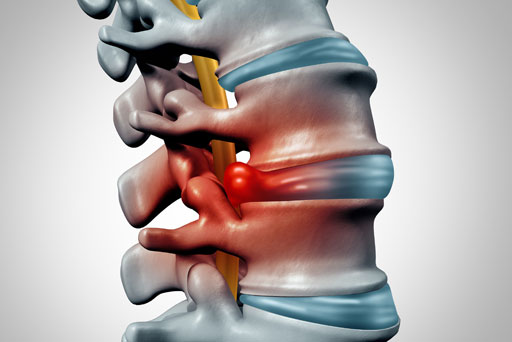 What is a Herniated Disk?
What is a Herniated Disk?
The spine is made up of a series of bones called vertebrae. And in between each of these bones is a cushion made of a rubbery substance. This cushion is referred to as a spinal disk.
A spinal disk is made up of a soft center with a stronger exterior, sort of like a jelly donut. The disk acts as a shock absorber, the same way shock absorbers in your car work – they protect the more delicate parts of your body from hard impact that occurs during physical activity. Thanks to these little disks, you rarely even notice the impact that occurs during things like walking or jogging, lifting, or even twisting your body around.
Any time some of the softer material inside of a spinal disk leaks out, it is called a herniated disk. You may also hear it referred to as a slipped disk, or a ruptured disk.
Causes of a Herniated Disk
A herniated disk can be caused by several different things:
Weight
Obesity is a common factor in patients who suffer from herniated disks. The body is designed to work optimally when it is in shape and height/weight proportionate. If a person becomes obese, it puts additional stress and strain on all parts of the body. Eventually, the body will start to break down under the pressure, and herniated disks can be one of the results.
Other Pre-existing Conditions
It is not uncommon for patients who have other pre-existing conditions, particularly ones that involve the bones (i.e. arthritis) to be more prone to developing herniated disks.
Repetitive Use
If you work at a job that involves repetitive movements of the back and hips, you are more likely to experience wear and tear of the spinal disks than say, someone who sits at a desk all day.
Injury
If you experience a back injury, such as one that occurs in an auto accident, the impact to your back and spine could cause herniated disks.
Genetics
Anyone who has an immediate family member suffering from a herniated disk is has a predisposition to experience herniated disks themselves.
Age
As we age, our bodies tend to lose water content. The inner portion of a spinal disk is made up largely of water, so when the water is reduced, the disks become less supple, and more prone to herniation.
Symptoms of a Herniated Disk
While many people may not have any symptoms of a herniated disk, those who do experience symptoms generally report suffering from one or more of the following:
- Pain
- Muscle
- Weakness
- numbness and tingling, most often on one side of the body
- stiffness
- loss of range of motion
Symptoms can occur in the arms, legs, neck and/or back. And some patients report that symptoms are worse at night, perhaps because the body has become tired after a full day of activity.
In most cases, the symptoms people experience are the results of pressure on the nerves surrounding the disk and vertebrae.
Diagnosis of a Herniated Disk
In many cases, your doctor can diagnose a herniated disk simply by doing a physical exam, and taking a history of your recent activity.
If you report that you’ve been in some type of accident that involved your back, or if you suddenly began experiencing pain and other symptoms after lifting something heavy at work, it is very likely that you’ve ruptured a disk. To confirm the diagnosis, your doctor may also perform the following types of tests:
- muscle strength testing
- reflex testing
- range of motion testing
As well, he/she may probe your body for areas that are sore or tender to the touch, or sensitive to pressure. Remember, the symptoms of a herniated disk are often caused by the nerves surrounding the affected area, so these tests can often confirm the diagnosis of a herniated disk.
If your doctor is not able to diagnose a herniated disk by the methods above, other tests may be required. These tests may include X-ray, MRI, CT scan, Discogram or Myelogram.
Treatment of a Herniated Disk
There are different treatment options available for a herniated disk:
Medical Treatment
Medical treatment for a herniated disk can include both over the counter and prescription medications, special injections, and sometimes even surgery. Surgery is generally reserved for patients whose symptoms are severe and interfering with their ability to live a normal, productive, pain-free life, and usually as a last resort after other treatment options have failed.
If surgery is the only option, the surgeon will try to perform what is called a discectomy – where only part of the disk is removed. If the herniation is severe, the entire disk will be removed, and metal supports may be inserted to help support the spine.
Chiropractic Treatment
At Broadway AT Yew Chiropractic & Massage in Vancouver, we can treat your herniated disk in a safe and natural way.
Just like with medical treatment, during your first chiropractic appointment, a full medical history will be taken, and a series of physical tests will be performed. Then, a treatment plan will be created to help address your symptoms. And it’s important to note, that your Vancouver Chiropractor will not just treat a part of your back or neck – chiropractic treatment always aims to treat the entire back. This will help prevent future injuries, and will help to maintain areas of the back that are still healthy.
Your treatment plan may include spinal adjustments and manipulations, stretches, and other exercises to help release pressure on the nerves that are causing your symptoms.
Along with your in-office chiropractic treatments, we may prescribe a series of at home treatments that include the use of a brace, using heat and ice to relieve pain, and different stretches to help keep your muscles limber.
Herniated disks are actually quite common, and can occur for a variety of reasons. Luckily there are also good and proven treatment options available, including those provided by Broadway AT Yew Chiropractic & Massage.



 What is a Herniated Disk?
What is a Herniated Disk?